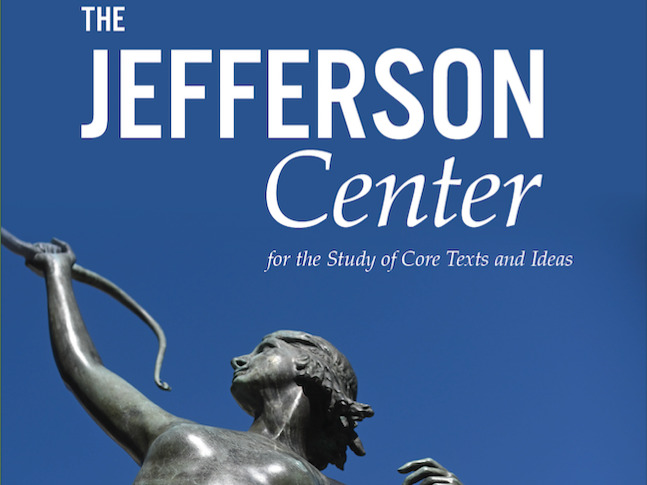About
The Jefferson Center is unique among the University of Texas at Austin’s myriad departments and centers. Our focus is not an academic discipline, a region, a time period, or any specialized body of knowledge in which we train graduate students and undergraduate majors; nor is it applied knowledge aimed at some particular vocation. Our mission is rather to counter the modern university’s drift towards fragmentation and specialization by creating a locus of sustained dialogue about questions of enduring significance and providing new ways for undergraduates to integrate their studies.
Overview of Our Programs
The Certificate Program in Core Texts and Ideas, our recommended program for undergraduates, is an introduction to the liberal arts through the study of the great books. It complements any major with an integrated sequence of six courses that can also satisfy UT general education requirements and fulfill students' minor/certificate requirement. Four fundamental courses introduce students to major works of religion, literature, philosophy, and political thought in the west from ancient to modern times. Electives cover more specialized topics, such as ancient Indian thought, Shakespeare, and Darwin. In all of these courses students will enter into debates about human nature, ethics, and the meaning of life that have unfolded over centuries and that have profoundly shaped the modern world.

Center Report
The Jefferson Scholars Program allows highly qualified students to pursue the Core Texts and Ideas certificate in an integrated learning community built around small classes beginning in their freshman year.
Students interested in majoring in the great books may want to consider the European Thought track in the European Studies major.
In addition to these academic programs, the Jefferson Center sponsors a student book club, interfaith and political discussion groups, course development grants for faculty, discussion sections in large lecture courses, and postdoctoral fellowships
What is a Core Text?
The texts we study include major works of philosophy, religion, history, and literature; seminal writings in the sciences and social sciences; works of art; and major political documents and speeches. They are works distinguished both by their depth of insight or creative originality and by their influence on subsequent thought or history. These texts are not the possession of any single nation, epoch, cultural tradition, or academic department. Each of them is, as Thucydides boldly but justly called his own work, “a possession for all time.” Each of them has proved to be, like Jefferson himself, profoundly influential, inspiring, subtle, multi-faceted, and challenging to decipher. Each has provoked opposing interpretations and conflicting assessments. Not in spite of but because of these challenges and controversies, these texts reward the closest study and generate especially fruitful discussion and reflection about the meaning of human life.
Those wishing to pursue a course of independent reading based on great books are invited to visit our bookshelf page. Further suggested readings may be found in the following lists:
Course Design
Courses in Core Texts and Ideas examine seminal texts with a number of related purposes. First, they aim to teach skills of close reading and careful interpretation. The ideal is for students to engage as directly as possible with the thought of the authors they are studying, so as to learn from them, not simply to learn about them. Recognizing that we come to each text with our own questions and conceptual framework, we encourage students to allow their perspectives to be challenged by the text even as they interrogate the text.
Second, our courses are meant to encourage students to think rigorously about questions of central and enduring human concern, refusing to assume either that the questions are susceptible of definitive and final answers or that the questions are unanswerable, but instead, maintaining an open mind as to how far reasoned discourse may take us. Examples of the questions considered are: Do human beings share an essence or nature, and if so, what is it? Does life have a meaning? Are there universal truths, can they be known, and if so, how? What is the good life, and how can political institutions best be ordered so as to foster it? What is the proper place of religion in human life? What is the essence of love, and of friendship? What is the proper place of philosophy or enlightenment? What is justice, or what do we owe, individually and collectively, to others and to ourselves? What is beauty?
Third, our courses aim to help students understand some of the most important answers that have been offered to these questions, answers that have shaped our own world. Each course will reflect intellectual pluralism, presenting more than one compelling answer to the questions considered. They will situate the ideas and works studied not only in their immediate political and cultural context but also as part of an ongoing debate between fundamentally different accounts of human nature, right and wrong, and humanity’s place in the cosmos. It order to challenge students with perspectives outside our contemporary milieu, a substantial portion of each course will normally be devoted to pre-20th century texts.
In pursuing these related aims, we seek to inculcate both openness and seriousness. With every major work studied, students will be encouraged to ask: If this thinker is right, what does it mean about how we should live our own lives, either as autonomous individuals or as a self-governing society?
